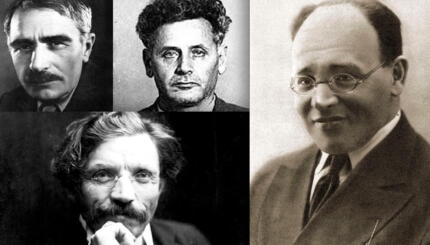Every culture has developed its own poetry. From ancient biblical songs to modern rap battles, there are numerous expressions of poetry in every culture. “Poetry in all languages is based on the length of a breath and the rhythm of the heart,” explains Emily Farranto. The New Orleans-based artist is the founder of Xenotheque, a multilingual poetry festival that she calls “an experiment about listening, community, and poetry.” (The term, coined by Farranto, derives from the Greek words for “stranger” and “receptacle” and roughly translated means “place where strangers come together.”)
The first Xenotheque event was held in 2014 and featured work in over 20 languages. “Many, or even most of the readers, were not writers or performers but came to read, to represent their country and language of origin or adoption,” explains Farranto. “People, regardless of nationality, have this in common. That and the strange impulse to write poems.”
Poet Bob Holman agrees: “Just as there is an ecology of the planet, there is an ecology of consciousness, with language as its manifestation. To hear the variety and beauty of poetry spoken in so many different tongues is to discover a new world.”
Last year, Be’chol Lashon organized in collaboration with poet Justin Marks the first Xenotheque event in Brooklyn, New York. Since then, Be’chol Lashon—which means “in every language” in Hebrew, reflecting the fact that Jews are a multicultural people who live all over the world—has brought Xenotheque to various university campuses. This year, in partnership with New York’s Bowery Poetry Club and Rattapallax, a non-profit focusing on poetry and transmedia storytelling, Xenotheque will make its debut in the virtual world.
“When the entire world is disconnected and sheltered in their private spaces, it is more important than ever for different cultures to come together,” says Ram Devineni, Rattapallax’s founder.
Gabon-born Aliya Mariane Bertout is excited to participate in Xenotheque again this year. “I had a wonderful time when I first participated [in the Brooklyn event], so it will be a thrill to be back, especially to keep up with the event during these special circumstances,” she says. As a French speaker living in the U.S., Bertout is fascinated by the nuances of expression and will read a poem about code switching—changing languages or the way you express yourself in the midst of a conversation—as well as loss and love.
Not surprisingly, love is a recurrent theme in the poetry selected for the event. Monique Balbuena will recite a Ladino poem by Argentine writer Juan Gelman. “The poem is a love poem, but it’s about time and language,” explains Balbuena about her choice. Ethiopia-born Bezawit Abede will read the Amharic poem “Abatye” (“My Father”) about a father’s love. “I chose it because it speaks to the admiration I have for my own father,” says Abebe.
Singer Sarah Aroeste will recite the poem “A mi kriatura” (“To my child”) by Matilda Koen-Sarano. “Matilda is one of my favorite living Ladino poets,” explains Aroeste. “It’s a poem, through a lullaby, about the wishes a parent has for a child, that she or he will grow up to be strong and good and pass the wisdom of Torah and goodness to their child.”
Mumbai-born artist Siona Benjamin picked an Urdu poem that connects her to her childhood. “The lines of this poem mean, ‘What you call this world is a magical toy; if you achieve it, it is mud and if you lose it, it is gold,’” explains the New Jersey-based painter. “I think these words are so appropriate for today’s crisis and what is happening in the world.”
The multilingual aspect of Xenotheque fascinated Benjamin. “Being a Jew raised in multicultural India and being an artist all my life, I have always embraced diversity and learning from all cultures and languages,” she says.
While most readers will recite poetry written by others, some participants decided to write their own pieces for this year’s Xenotheque. “My poem is English mixed with Arabic,” explains Iraq-born Jewish educator Ceen Gabbai. “The story revolves around a person who hears sad whispers while asleep and finds out that it’s a butterfly’s voice. The English verses tell the story of the butterfly while the Arabic one tells the story of the human.”
Laos-born Souksavat Soukhaseum also decided to write a poem dealing with wanderlust. “I wrote the poem because I am, like everyone else, a bit stir-crazy being isolated from friends and family and not able to travel freely,” he says “The poem gives me hope that one day I will be free.” The outreach director of the Free Synagogue in Flushing, Queens, Soukhaseum is excited to be part of this year’s event. “Words and emotions play a great deal on how one sees and interprets the world,” he says “However when the words are in one’s native tongue, we see another dynamic of someone’s emotions.”
Xenotheque will be streamed live on Be’chol Lashon’s Facebook page on Friday, May 1 at 3:00 PM EST. Click here for more information.



